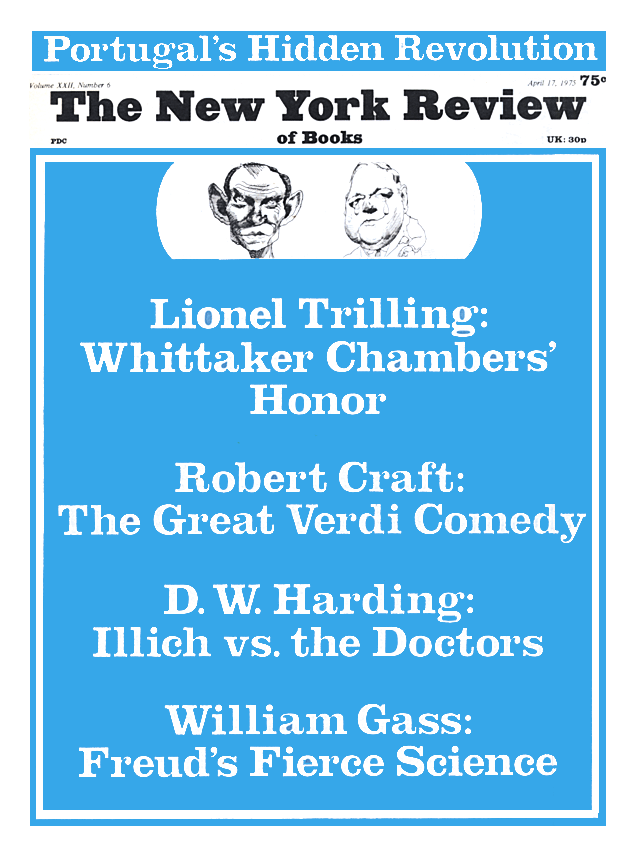In response to:
Cards of Identity from the March 6, 1975 issue
To the Editors:
There was a time when Donald Davie would have agreed with me that criticism ought not to engage in the spreading of untrue legends about poets’ lives, but in the refinement of our ignorance of their work. Shedding this, as if it were a woolly English garment, unfit to be worn in the Californian heat, he begins his review of High Island [NYR, March 6] by saying: “I remember twenty years ago walking across a Wicklow hillside with Richard Murphy, and his Old English sheep-dog bounding to meet us.” No line of my poetry mentions or concerns that animal, nor did she belong to me, but to Patricia Avis, who was then my wife. But much of what Davie says about the problem of my “fate” and my “inheritance” is equally off the mark.
He portrays me as an Anglo-Irishman of “the sort that Yeats celebrated and venerated in the persons of Augusta Gregory and her son Robert; the landed gentry, English by race, usually by religion and often enough by education….” The picture is impressionistic, but not true. My mother belonged to a family who owned estates in Mayo as beautiful and as bankrupt as Coole: but my father was Irish by race, as our name declares—some say it means “sea-fighter”—and he was educated in Ireland by winning scholarships all the way from an impoverished rectory seven miles from where I have lived for the past fifteen years. Dr. Isabella Mulvany, one of the first Irish women ever to receive an honorary degree, was my great-aunt. Like my father, she owned neither land nor house in Ireland, where she spent her life.
So when Davie says of my long history poem The Battle of Aughrim: “if I read the case aright, all Murphy’s forebears would have been on the other, the winning side” (i.e., the English Protestant side), like a true Englishman he is reading the Irish case wrong, although there is nothing in my book to encourage him to do this. On p. 53 of High Island it states that our ancestors fought “in opposite camps” at the behest of “absent kings.” And on p. 72 I address Patrick Sarsfield, who fought on the losing Catholic Irish side, as my “great uncle,” not vainly striving to identify myself with the equivalent of an Apache hero in the wars against the Yanqui conquerors, but precisely talking to the portrait of a man who was an uncle of mine ten generations removed.
I suggest that the division of Ireland is not just in our country, but in every Irishman’s blood; and has to be resolved individually, before the conflict can be settled as a whole. One should not falsify the ancient and current Irish equation with passionate simplicities, but try to clarify by defusing some of the explosive credal myths. Ultimately our divisive legends, some of which I explore in the long poem, turn out, like Davie’s misunderstanding of the sheep-dog, to be grounded in error and ignorance. Verse of the lowest possible intensity can be convenient if you’re dealing with an unexploded highly rhetorical bomb.
Richard Murphy
Princeton, New Jersey
Donald Davie replies:
Who would suppose, reading Murphy’s letter, that I described his poetry as “irreplaceable”? That I credited him with verse-lines “among the most memorable, for dignity and poignancy combined, of any in modern English”? What is it the Irish do want, one wonders, from the English or any one else?
Readers will not suppose that when I was greeted by the dog of his household twenty years ago, I bent down to see whose name—his or his wife’s—was on the dogcollar; nor that before writing my review I studied the poet’s genealogy on both sides through ten generations, so as to pick out Patrick Sarsfield perched on one of its spreading branches. Murphy is the son of Sir William Lindsay Murphy, one-time Governor of the Bahamas; he was educated at Canterbury Cathedral Choir School, at King’s School, Canterbury, at Wellington College, Berkshire, and at Magdalen College, Oxford. Will he deny that these facts fall into a pattern that may reasonably be called “Anglo-Irish,” or even, in any previous generation, “Protestant Ascendancy”? God knows, it is nothing to be ashamed of! Why does he bridle at it? I defined his Anglo-Irish stock as “landed gentry, English by race, usually by religion and often enough by education….” And all he can say by way of proving this “not true” is that his family was “landed” only on his mother’s side! What is all this about, anyway? I aimed at the refinement of our ignorance of his work: and I still think that the information I gave about him was helpful and necessary to that end.
This Issue
April 17, 1975


